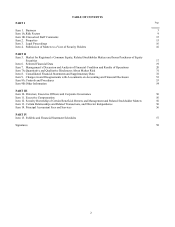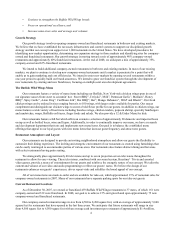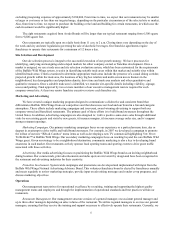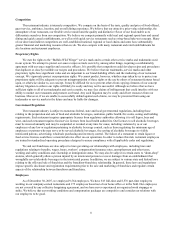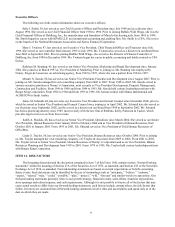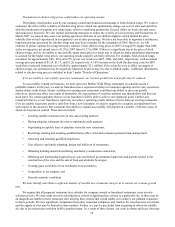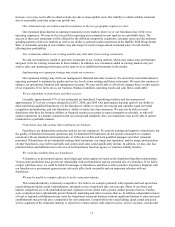Buffalo Wild Wings 2007 Annual Report Download - page 12
Download and view the complete annual report
Please find page 12 of the 2007 Buffalo Wild Wings annual report below. You can navigate through the pages in the report by either clicking on the pages listed below, or by using the keyword search tool below to find specific information within the annual report. 12
the type and quality of food. We also face intense competition for real estate sites, qualified management personnel and
hourly restaurant staff.
A reduction in vendor allowances currently received could affect our costs of goods sold.
During fiscal 2007, 2006, and 2005, vendor allowances were recorded as a reduction in inventoriable costs, and cost of
sales was reduced by $4.6 million, $4.2 million, and $4.0 million, respectively. If the amount of vendor rebates is reduced,
inventoriable costs may increase, as may the cost of sales.
Our quarterly operating results may fluctuate due to the timing of special events and other factors, including the
recognition of impairment losses.
Our quarterly operating results depend, in part, on special events, such as the Super Bowl® and other popular sporting
events, and thus are subject to fluctuations based on the dates for such events. Historically, sales in most of our restaurants
have been higher during fall and winter months based on the relative popularity of national, regional and local sporting and
other events. Further, our quarterly operating results may fluctuate significantly because of other factors, including:
• Increases or decreases in same-store sales;
• Fluctuations in food costs, particularly fresh chicken wings;
• The timing of new restaurant openings, which may impact margins due to the related preopening costs and initially
higher restaurant level operating expense ratios;
• Labor availability and costs for hourly and management personnel;
• Changes in competitive factors;
• Disruption in supplies;
• General economic conditions and consumer confidence;
• Claims experience for self-insurance programs;
• Increases or decreases in labor or other variable expenses;
• The impact from natural disasters;
• Fluctuations in interest rates; and
• The timing and amount of asset impairment loss and restaurant closing charges.
As a result of the factors discussed above, our quarterly and annual operating results may fluctuate significantly.
Accordingly, results for any one quarter are not necessarily indicative of results to be expected for any other quarter or for
any year. These fluctuations may cause future operating results to fall below the expectations of securities analysts and
investors. In that event, the price of our common stock would likely decrease.
We may not be able to attract and retain qualified personnel to operate and manage our restaurants.
Our success and the success of our individual restaurants depends on our ability to attract, motivate and retain a
sufficient number of qualified restaurant employees, including restaurant managers, kitchen staff and wait staff. The inability
to recruit and retain these individuals may delay the planned openings of new restaurants or result in high employee turnover
in existing restaurants. This could inhibit our expansion plans and business performance and, to the extent that a labor
shortage may force us to pay higher wages, harm our profitability. Further, the loss of any of our executive officers could
adversely impact us.
We may not be able to obtain and maintain licenses and permits necessary to operate our restaurants.
The restaurant industry is subject to various federal, state and local government regulations, including those relating to
the sale of food and alcoholic beverages. The failure to obtain and maintain these licenses, permits and approvals, including
food and liquor licenses, could adversely affect our operating results. Difficulties or failure to obtain the required licenses and
approvals could delay or result in our decision to cancel the opening of new restaurants. Local authorities may revoke,
suspend or deny renewal of our food and liquor licenses if they determine that our conduct violates applicable regulations.


